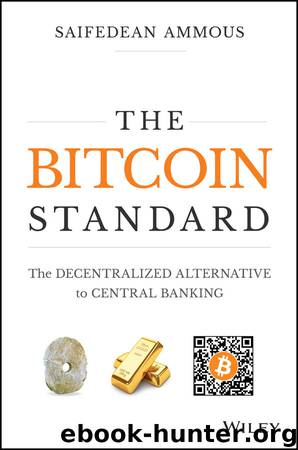The Bitcoin Standard: The Decentralized Alternative to Central Banking by Saifedean Ammous

Author:Saifedean Ammous [Ammous, Saifedean]
Language: eng
Format: azw3
ISBN: 9781119473916
Publisher: Wiley
Published: 2018-03-23T04:00:00+00:00
Murray Rothbard concurs with Mises:9
A world of constant money supply would be one similar to that of much of the eighteenth and nineteenth centuries, marked by the successful flowering of the Industrial Revolution with increased capital investment increasing the supply of goods and with falling prices for those goods as well as falling costs of production.
According to the Austrian view, if the money supply is fixed, then economic growth will cause prices of real goods and services to drop, allowing people to purchase increasing quantities of goods and services with their money in the future. Such a world would indeed discourage immediate consumption as the Keynesians fear, but encourage saving and investment for the future where more consumption can happen. For a school of thought steeped in high time preference, it is understandable that Keynes could not understand that increased savings' impact on consumption in any present moment is more than outweighed by the increases in spending caused by the increased savings of the past. A society which constantly defers consumption will actually end up being a society that consumes more in the long run than a low savings society, since the low‐time‐preference society invests more, thus producing more income for its members. Even with a larger percentage of their income going to savings, the low‐time‐preference societies will end up having higher levels of consumption in the long run as well as a larger capital stock.
If society were a little girl in that marshmallow experiment, Keynesian economics seeks to alter the experiment so that waiting would punish the girl by giving her half a marshmallow instead of two, making the entire concept of self‐control and low time preference appear counterproductive. Indulging immediate pleasures is the more likely course of action economically, and that will then reflect on culture and society at large. The Austrian school, on the other hand, by preaching sound money, recognizes the reality of the trade‐off that nature provides humans, and that if the child waits, there will be more reward for her, making her happier in the long run, encouraging her to defer her gratification to increase it.
When the value of money appreciates, people are likely to be far more discerning with their consumption and to save far more of their income for the future. The culture of conspicuous consumption, of shopping as therapy, of always needing to replace cheap plastic crap with newer, flashier cheap plastic crap will not have a place in a society with a money which appreciates in value over time. Such a world would cause people to develop a lower time preference, as their monetary decisions will orient their actions toward the future, teaching them to value the future more and more. We can thus see how such a society would cause people not only to save and invest more, but also to be morally, artistically, and culturally oriented toward the long‐term future.
A currency that appreciates in value incentivizes saving, as savings gain purchasing power over time. Hence, it encourages deferred consumption, resulting in lower time preference.
Download
This site does not store any files on its server. We only index and link to content provided by other sites. Please contact the content providers to delete copyright contents if any and email us, we'll remove relevant links or contents immediately.
Bad Blood by John Carreyrou(5768)
Principles: Life and Work by Ray Dalio(5321)
Rich Dad Poor Dad by Robert T. Kiyosaki(5147)
Management Strategies for the Cloud Revolution: How Cloud Computing Is Transforming Business and Why You Can't Afford to Be Left Behind by Charles Babcock(4130)
The Confidence Code by Katty Kay(3566)
Thinking in Bets by Annie Duke(3531)
American Kingpin by Nick Bilton(2970)
Playing to Win_ How Strategy Really Works by A.G. Lafley & Roger L. Martin(2947)
Delivering Happiness by Tony Hsieh(2922)
Project Animal Farm: An Accidental Journey into the Secret World of Farming and the Truth About Our Food by Sonia Faruqi(2659)
Brotopia by Emily Chang(2591)
I Live in the Future & Here's How It Works by Nick Bilton(2524)
Mastering Bitcoin: Programming the Open Blockchain by Andreas M. Antonopoulos(2509)
The Content Trap by Bharat Anand(2493)
The Power of Habit by Charles Duhigg(2488)
The Marketing Plan Handbook: Develop Big-Picture Marketing Plans for Pennies on the Dollar by Robert W. Bly(2413)
The Tyranny of Metrics by Jerry Z. Muller(2401)
Building a StoryBrand by Donald Miller(2360)
Applied Empathy by Michael Ventura(2327)
